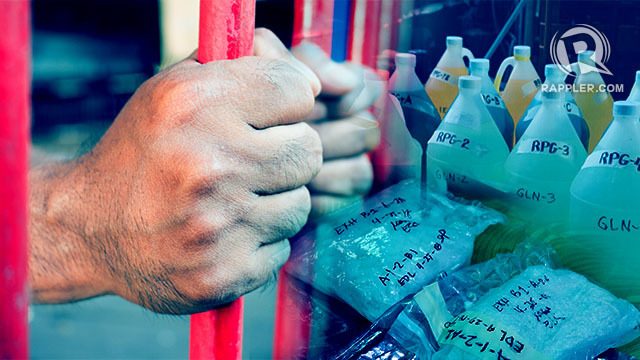SUMMARY
This is AI generated summarization, which may have errors. For context, always refer to the full article.


MANILA, Philippines – A recent Social Weather Stations (SWS) survey found that if there are other alternatives, less people agree with reinstating the death penalty for those who commit serious crimes related to illegal drugs.
Results of the March 2018 SWS survey released on Wednesday, October 10, showed that less than 40% of Filipinos believe that the death penalty should be the punishment for people convicted of 7 crimes related to illegal drugs.
The survey, commissioned by the Commission on Human Rights (CHR), asked respondents what the punishment should be for those found to have committed:
- Importation of illegal drugs
- Maintenance of drug dens
- Manufacture of illegal drugs
- Murder under the influence of drugs
- Rape under the influence of drugs
- Sale of illegal drugs
- Working in drug dens
The options include 20 years of imprisonment, 40 years of imprisonment, life imprisonment, or death penalty.
Out of all the crimes linked to illegal drugs, at least 47% agree that the death penalty should be the sanction for those who commit rape under the influence. The other 6 crimes, meanwhile, showed a demand for the capital punishment at only 22% to 33%.
The survey found that the demand for life imprisonment for the 7 crimes hit more than 50%, with the highest at 78% for those convicted of working in drug dens.
Among those who disagree with the death penalty, at least 42% cite religious reasons for opposing it, 21% think it is possible that a criminal would reform, 14% believe there are alternatives to death, 10% cite the questionable justice system, 7% cite humane reasons, and 3% question the policy itself.
According to Dr Mahar Mahangas, SWS president, the results show that alternatives to the death penalty are preferred by many Filipinos.
“When you put the options, you don’t get a large number for death penalty on any crimes linked to illegal drugs,” he said. “That is, to me, the strongest finding of this survey.”
The SWS survey was conducted among 2,000 people aged 15 and up distributed equally in the National Capital Region, North Luzon, Central Luzon, South Luzon, Visayas, and Mindanao. It said there were sampling error margins of ±2.2% nationwide and ±5% for each study area.
Debates on the death penalty
The survey, according to SWS and CHR, is the first of its kind to “explore thought process and disentangle layers of perceptions about [the] death penalty.”
“This method also shows us that if people are given options, their responses will be more diverse, and can convey what they truly believe in,” CHR Commissioner Karen Gomez Dumpit said.
“We were also able to prove that dealing with [the] death penalty issue should be more than just asking whether to reimpose it or not,” she added.
The death penalty was abolished in the Philippines during the administration of Gloria Macapagal Arroyo in 2006.
Its reimposition was among the campaign promises of President Rodrigo Duterte. But only the House of Representatives has passed a bill more than 3 years into his administration. A counterpart has not prospered in the Senate.
The Department of the Interior and Local Government (DILG) in August 2018 said the death penalty will be helpful to the government’s anti-illegal drugs campaign.
But groups have continuously opposed calls for its reimposition, citing the country’s flawed justice system, among other reasons. – Rappler.com
Add a comment
How does this make you feel?
There are no comments yet. Add your comment to start the conversation.